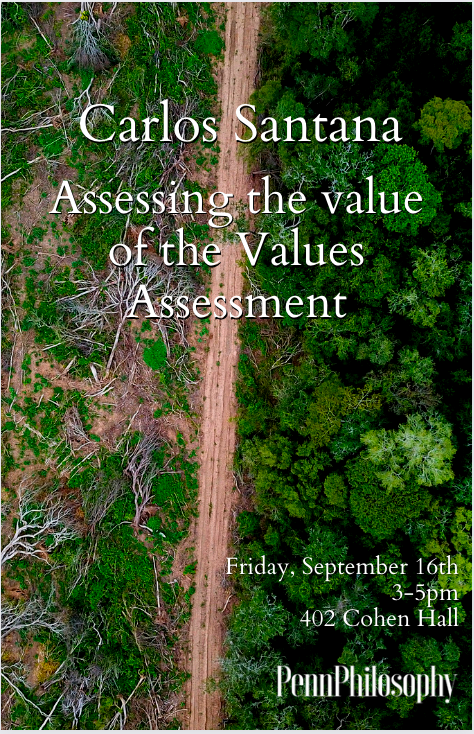Cohen 402

Please join us on Friday, September 16th for a Penn Philosophy colloquium featuring Professor Carlos Santana. Dr. Santana is an Associate Professor at the University of Utah specializing in the philosophy of earth and environmental science. This event will begin at 3pm in Claudia Cohen Hall 402 with a reception to follow.
Abstract
In this paper I explain why promoting environmental valuation—practices of measuring the values of nature—might not be an effective solution to the environmental crises we face.
This July, IPBES (an intergovernmental group like the IPCC, but for ecology and biodiversity) approved a “Values Assessment” integrating research on the value of nature. A key feature of the report is its endorsement of plural methods of valuation as a necessary input to policy-making. The report’s thesis, of a sort, is: “We’re in this mess because policy reflects only a limited subset of the values of nature, but we have 50+ valuation methods, so let’s use them.”
While there’s a lot to like in the Values Assessment, I don’t think bad environmental policy is driven by insufficient valuation. In fact, I think there are four ways IPBES’ focus on valuation clashes with its other commitments: (1) In treating valuation as a distinctive practice from policy-making, they undercut the systemic, institutional reforms they argue are necessary. (2) IPBES recognizes that we need to shift values, not just assess them, and the focus on valuation detracts from doing so. (3) Diverse valuations lead to environmentally healthier policy only if those diverse values are complementary. In key cases, they’re not. (4) IBPES has little idea what to do with indigenous practices of land relations, which often don’t involve valuation.
Valuation runs the risk of serving as "understanding porn" without really challenging the status quo. We’re not skipping towards the apocalypse because we don’t understand why and how nature is valuable—we absolutely do, at least in broad strokes. As the Values Assessment repeatedly reminds us, valuation is resource intensive. Those resources are often going to be better spent on other fights in the battle for a healthy planet.
tl;dr: making changes > making measurements

 Department of Philosophy
Department of Philosophy